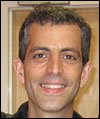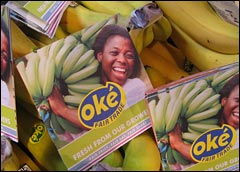
Jonathan Rosenthal.
What work do you do?
I am the top banana at Oké USA, a new fair-trade fruit company owned by farmers, fair-trade organizations, and nonprofits.
What does your organization do?
Oké USA is a new model of fair trade that links farmers, fair-trade organizations, and eaters. Farmers get a fair price, a fair share, and a fair say; eaters get a delicious banana at a fair price.
We guarantee farmers a living wage, even when international prices are inhumanely low. Farmers own half of our main parent company, AgroFair, and get a share of profits. Oké bananas are all organic or grown with ecological standards that minimize pesticide use.
We are well supported by AgroFair, a $60 million per year European fair-trade fruit company; Red Tomato, an innovative nonprofit marketing organization helping family farmers in the U.S. survive; and Equal Exchange, the U.S.’s pioneering fair-trade coffee (and now tea and chocolate) company.
What are you working on at the moment?

Orange you glad they don’t exploit banana workers?
Photo: Agrofair/K. Viemose
We just began importing organic fair-trade bananas from Ecuador in August. El Guabo, a cooperative of over 300 family farmers, produces the bananas. We are already shipping a container every week — about 100,000 bananas! We will soon be importing ecological (integrated pest management) fair-trade bananas from Coopetrabasur, a worker-cooperative plantation in Costa Rica managed by over 70 banana farmers.
In the coming years, we will expand to import mangoes, pineapples, coconuts, and other tropical fruits.
How do you get to work?
I mostly work out of my house. We also have space inside the offices of Red Tomato in Canton, Mass., about 23 miles away. I travel there one or two days per week in my 1996 Saturn SW2. I also travel regularly by car to the Chelsea produce market where our bananas are ripened and stored.
What long and winding road led you to your current position?
In 1980, in Boston, I got a job in a food cooperative warehouse as a warehouse worker. I began working with two colleagues, Michael Rozyne and Rink Dickinson, to steer the co-op movement back in a direction where we could support social change, especially in Third World countries. Eventually, we started a worker cooperative and began selling a small line of coffees, mostly from Nicaragua. We experimented with Cape Verdean tuna fish, Mexican honey, Sri Lankan tea from a Buddhist development movement, and Filipino banana chips. Eventually, we realized coffee worked much better than these other food products. We ended up developing a line of coffees from about a dozen countries.
Our small experiment — could we hold on to our values and run a successful business, something unheard of in the 1980s? — is now a more-than-$20-million company and is still a worker cooperative sticking to its ideals. Now, though, there are more than 400 other companies doing the same thing through a program called fair-trade certified.
What people said couldn’t be done is now considered good business practice! While we didn’t create all of the change ourselves, we are proud of playing a role in showing that not only can business be accountable to social and ecological ideals, it must be if life on planet earth is to survive.
Where were you born? Where do you live now?
I was born in New York City and lived in several suburban locations during my childhood. I moved to Waterville, Maine, for college and dropped out after two years to focus on political organizing. I moved to Boston for a summer in 1980. And 26 years later, I am still here.
Who is your environmental hero?
One of the people I most respect on the planet is Vandana Shiva. She is a courageous, articulate, and tireless leader for cultural, environmental, and social justice. Her ability to weave together many different perspectives and philosophies is inspiring and humbling.
What’s your environmental vice?
My first vice is that I am living a fairly typical middle-class life. For example, my immediate family owns and drives two cars.
How do you spend your free time? Read any good books lately?
I spend my free time having fun with my family (my wife, Ora Grodsky, and my two daughters, Sasha and Zoe), doing yoga, and reading. In addition to newspapers, too many magazines, and blogs, I read one or two novels a week.
What’s your favorite meal?
Southern Indian cooking, especially masala dosa, is wonderful. I think good company is an important ingredient for a great meal.
What’s your favorite place or ecosystem?
The Findhorn Foundation in Findhorn, Scotland. It is an intentional spiritual community I have visited several times. I have found deep spiritual challenges there and deep spiritual connection.
If you could institute by fiat one environmental reform, what would it be?
Require all national politicians to take a dose of Sodium Pentothal before all public appearances, to enhance their truthfulness. One immediate result would be the dramatic engagement of the government in reversing our death march into the impending global climate holocaust.
Who was your favorite musical artist when you were 18? How about now?
My favorite music when I was 18 was Bob Dylan‘s. Now, I have many musical loves and interests, including Silvio Rodríguez. Interestingly, he has been called the Bob Dylan of Cuba. I especially love his live album with Eduardo Aute, Mano a Mano. Lately, I have been listening to a song called “19 Miles to Baghdad” by Lizzie West.
What’s your favorite movie?
The movie that comes to mind was made by a couple of friends. It’s called A Panther in Africa. It is a fascinating look at America, race, fame, and the passage of time.
Which actor would play you in the story of your life?
I don’t have a clear vision of one person, but a good friend has told me about the big heart of Noah Wyle. He could do a good job, I think, of playing me.
If you could have every InterActivist reader do one thing, what would it be?
Spend one day where you ask yourself about each person you encounter — in person, on the telephone, email, IM, etc. — how can I be of service to this person today?

